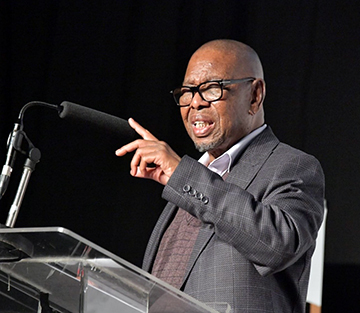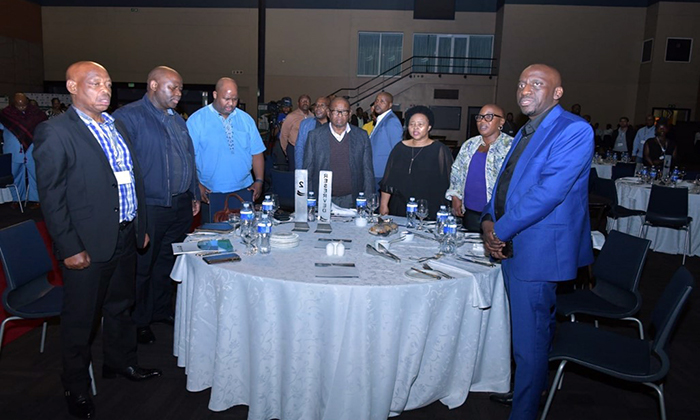News & Events
Unisa KZN Region hosts historic Simiso Nkwanyana Memorial Lecture
The Unisa KwaZulu-Natal (KZN) Region hosted a historic Simiso Nkwanyana Memorial Lecture on 9 October 2023. The Minister of Higher Education, Science and Innovation, Dr Blade Nzimande, presented the inaugural lecture at the Durban International Convention Centre (ICC). Among several distinguished guests was Gcina Nkwanayana, Simiso's wife, his children, family representatives, a Member of the Executive Council (MEC) for Human Settlements and Public Works in KZN, Sipho Nkosi, Deputy Minister of the Department of Trade, Industry and Competition, Nomalungela Gina and former president of COSATU, Sdumo Dlamini.

Dr Blade Nzimande, Minister of Higher Education, Science, and Innovation
The lecture aimed to remember and honour the life and times of former Unisa student leader and the KZN Provincial Secretary of the South African Communist Party (SACP), Simiso Derrick Nkwanyana. In his long and illustrious list of accolades, Nkwanyana was also the youngest Provincial Secretary the SACP ever elected, and one of the rising stars in the SACP in KZN.
Nkwanyana was at the forefront of the militant campaigns for working-class rights. As a student leader, he knew that the student struggles were inextricably linked to the broader struggles of the working class and poor.
He knew that the freedom of access to education is bound up with the emancipation of all people from class oppression and exploitation. He knew students’ and workers’ struggles were indivisible. Having started his political activism in the African National Congress (ANC) Youth League and the South African Students Congress (SASCO) in the early 1990s, his significant contribution was seen in his leadership at Unisa before and after the 1994 democratic breakthrough, where he and his comrades fought heroic battles faced by students at the time.
Nkwanyana was arrested twice as a Student Representative Council (SRC) leader for leading students' actions. In the post-1994 setup, he was still an SRC leader and became part of the Broad Transformation Forum representative that sat on the university council. This status created a path within which they put forward a transformative agenda for Unisa at all levels to reflect the post-apartheid higher education landscape.
Nkwanyana was popularly known for his laughter. His bonhomie traits were demonstrated by his ability to connect with different levels of people from various social statuses. He could easily associate with the elite as their equal while putting his ideas across, and later in the day; he would proceed to the informal settlement to address poverty problems most genuinely. The following day, he would be leading a COSATU march against retrenchments of workers, if not conducting a political workshop for students' organisations.
In 1996, Nkwanyana was appointed Chairperson of the Unisa Sub-Committee on Education Transformation. His primary role was achieving a non-sexist, non-racial and democratic education system. The committee was under the Unisa Broad Transformation Forum, established for the university to drive the transformation agenda.

Distinguished guests at the lecture
Representing the Vice-Chancellor and Principal, Professor LenkaBula, Professor Zodwa Motsa Madikane affirmed the university's commitment to uplift youth leadership in the country. Motsa Madikane further highlighted the university's commitment to recognising Nkwanyana, witnessed by renaming the Unisa Durban Hub Building to Simiso Nkwanyana Building in 2019.
There were messages of support from the Premier of KZN, Nomsa Dube-Ncube, whose message was read by the MEC for Human Settlements and Public Works, Sipho Nkosi. The Dean of Students was represented by Bheki Nxumalo, who spoke at length about the importance of student leadership in the life of the university. The lecture was later debated by Professor Somadoda Fikeni, Commissioner of the Public Service Commission, and Mfanafuthi Sithebe, Director of the Department of Higher Education and Training, who both dissertated the pertinent issues raised by the minister.
All speakers thanked the Nkwanyana family for allowing the university to inaugurate the memorial lecture. Speaking on behalf of the family, Khaye Nkwanyana eloquently narrated his brother's political and educational journey, which started in the rural areas of KZN and sadly ended in Durban at Unisa and as the SACP Provincial Secretary at the time of his untimely death.
#Unisa150
*By Sakhile Mtshali, Communication and Marketing, KZN Region
Publish date: 2023/10/10
